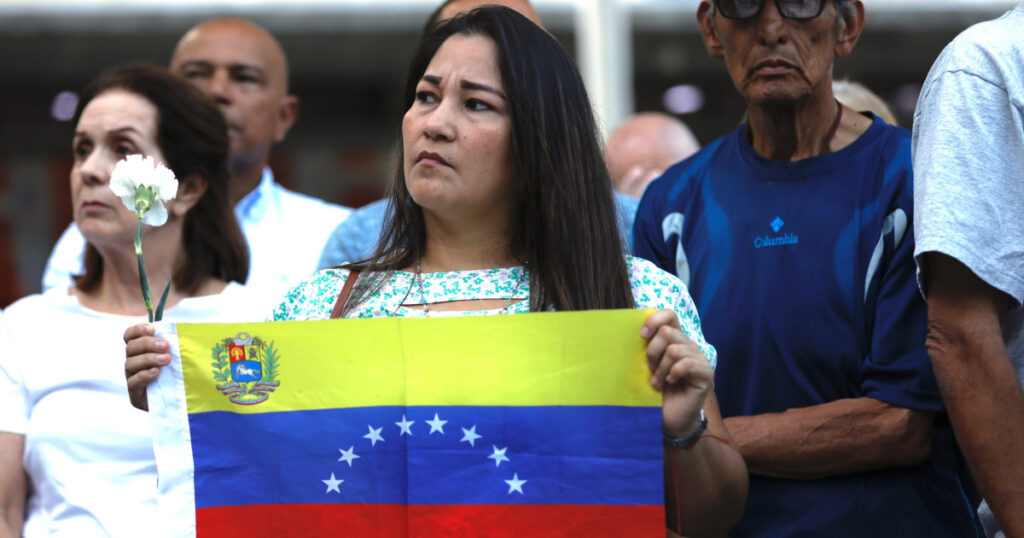More than two weeks after Venezuelan President Nicolas Maduro declared himself the winner of re-election, the United States and other Western countries have shown little sign of immediately taking tough action against what many are denouncing as vote fraud.
Most governments have called on Venezuela’s National Electoral Commission (CNE) to release the full set of vote tallies after Maduro and opposition candidate Edmundo Gonzalez declared victory. Countries such as Brazil have sought to secure talks between the two political rivals, who have not reconciled for decades.
Protests against President Maduro in the days after the vote were met with a crackdown, with authorities denouncing the demonstrations as an attempted “coup”. Twenty-three people have been killed and more than 2,000 arrested, according to UN figures released on Monday.
Western governments are trying to respond “slowly,” said the embassy official, who spoke on condition of anonymity because he was not authorized to speak publicly about the matter. No government wants to get ahead of anything, he added.
“This is not a competition of who can carry their demands the furthest with lip service, but of who can effectively support democracy in Venezuela,” Spanish Foreign Minister José Manuel Álvarez said at a senate hearing on Tuesday.
Spain, with deep ties to its former colonies, is “leading the EU’s position” against violence in Venezuela and upholding rights such as the freedom of peaceful assembly, he said.
Three officials from different countries said they had taken a cautious approach, bearing in mind what happened after Maduro’s 2018 reelection.
The vote was quickly denounced as a sham and led to the toughest sanctions ever imposed on an OPEC member state. Though an opposition-led interim government was widely recognised abroad, the effort ultimately fizzled out and Maduro’s power was consolidated.
There appears to be little appetite for tougher sanctions in Washington, which blocked vital Venezuelan oil exports under Republican President Donald Trump, and Democratic U.S. officials have so far held off on new punitive measures despite warning of them.
A person familiar with Washington’s thinking said Venezuelans want even “small concessions” from President Maduro and that the Biden administration is careful not to complicate the progress of the opposition, led by Maria Corina Machado and her candidate, Gonzalez.
Part of these concessions involves open channels of communication between the two sides, which the opposition hopes will lead to a fair adjudication of the election results and a possible transition of power.
The review by Venezuela’s Supreme Court is likely to take time and may not be impartial because the court is made up of allies of President Maduro.
U.S. officials are working with regional and international partners to coordinate a response, the three sources said. The United States has carefully recognized Gonzalez as the winner of the July 28 election but has not called him the president-elect.
“Now is the time for Venezuelan parties to begin negotiations towards a respectful and peaceful transition of power,” State Department deputy spokesman Vedant Patel said Monday.
He added that Washington was considering various options “to put pressure on President Maduro and return Venezuela to the democratic path.”
But the Biden administration appears to have limited options. The United States reimposed some oil sanctions on Venezuela in April, accusing President Maduro of breaking election promises, and has imposed sanctions on numerous individuals over the past five years, including the head of the CNE, Elvis Amoroso.
According to Washington-based sources, U.S. officials have expressed concern that post-election unrest could encourage more Venezuelans to leave the country and head to the U.S.-Mexico border, which could pose new problems for Vice President Kamala Harris as she runs for president, with immigration already a hot button issue.
The Venezuelan Foreign Ministry and the U.S. Treasury Department did not immediately respond to requests for comment. “We do not discuss the content of informal diplomatic discussions,” a State Department spokesman told Reuters.
A divided America
The Washington-based Organization of American States has failed to agree on a joint response, even as the regional group’s electoral cooperation observers released a detailed report on “irregularities, flaws and malign practices” during the elections.
“The official results are not credible and do not deserve democratic recognition,” the July 30 report concluded.
The presidents of Brazil, Mexico and Colombia are coordinating their actions, calling for full access to voting records, while a coalition including the United States, Canada, Panama and others is in talks separately and with Venezuela’s opposition, according to people familiar with the matter.
Panama has offered political asylum to Maduro – a controversial offer because the president is under investigation by the International Criminal Court for alleged human rights abuses – and has called for a regional summit to discuss the election results.
A Brazilian government source said Brazil would not recognise Maduro’s victory without full disclosure and verification of the results, adding that officials were growing concerned about escalating violence and the threat of further political arrests.
“A message has been sent to President Maduro making it clear that there will be no arrests of Messrs. Gonzalez and Machado,” the source said, adding that Brazil was focused on dealing with both men.
The European Union said last week there was insufficient evidence to support the CNE’s announcement of Maduro’s victory and did not expect any action.
Countries including China, Russia, Nicaragua and Cuba have recognized President Maduro’s victory and expressed their support.
For more from NBC Latino, sign up for our weekly newsletter.



